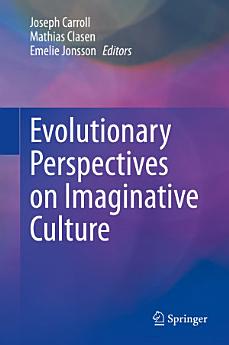Evolutionary Perspectives on Imaginative Culture
About this ebook
This pioneering volume offers an expansive introduction to the relatively new field of evolutionary studies in imaginative culture. Contributors from psychology, neuroscience, anthropology, and the humanities probe the evolved human imagination and its artefacts. The book forcefully demonstrates that imagination is part of human nature. Contributors explore imaginative culture in seven main areas:
- Imagination: Evolution, Mechanisms and Functions
- Myth and Religion
- Aesthetic Theory
- Music
- Visual and Plastic Arts
- Video Games and Films
- Oral Narratives and Literature
Evolutionary Perspectives on Imaginative Culture widens the scope of evolutionary cultural theory to include much of what “culture” means in common usage. The contributors aim to convince scholars in both the humanities and the evolutionary human sciences that biology and imaginative culture are intimately intertwined. The contributors illuminate this broad theoretical argument with comprehensive insights into religion, ideology, personal identity, and many particular works of art, music, literature, film, and digital media.
The chapters “Imagination, the Brain’s Default Mode Network, and Imaginative Verbal Artifacts” and “The Role of Aesthetic Style in Alleviating Anxiety About the Future” are licensed under the terms of the Creative Commons Attribution 4.0 International License (http://creativecommons.org/licenses/by/4.0/).
About the author
Joseph Carroll is Curators’ Distinguished Professor in the English department at the University of Missouri, St. Louis. Since the early 1990s, he has been working to integrate evolutionary research and literary study. He has developed an evolutionary theory of literature, produced interpretive essays on literary works ranging from plays of Shakespeare to modern novels, written essays in intellectual history, and conducted empirical research on protagonists and antagonists in Victorian fiction.
Mathias Clasen is associate professor in literature and media in the English Department, Aarhus University, and associate editor of Evolutionary Studies in Imaginative Culture. His research focuses on horror entertainment from an evolutionary perspective. His book Why Horror Seduces was published by Oxford University Press in 2017.
Emelie Jonsson is assistant professor of English literature at the University of Tromsø, Norway. Her research centers on the friction between human psychology and naturalistic cosmology. She has published evolutionary interpretive arguments on E. M. Forster, H. G. Wells, Arthur Conan Doyle, T. H. Huxley, and Edward Bulwer Lytton, as well as collaborated on quantitative projects concerning intellectual history, biocultural theory, and poetic archetypes reflecting mating strategies. She is an associate editor of Evolutionary Studies in Imaginative Culture.





